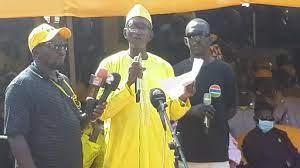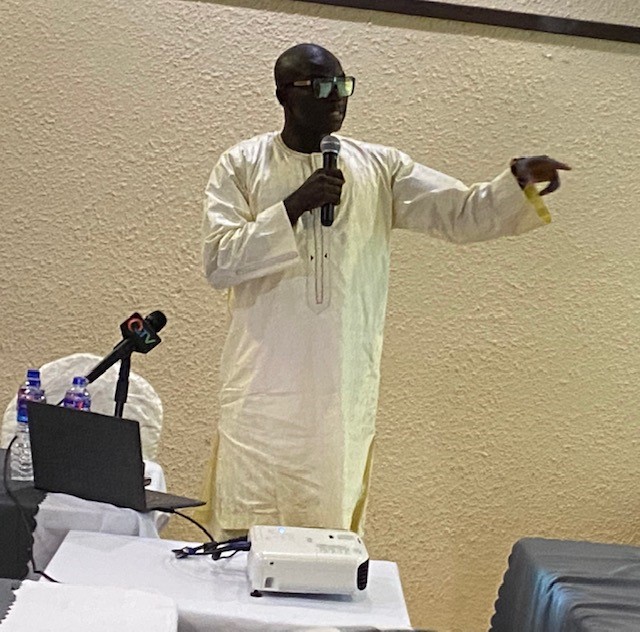Before the December 2016 presidential election, many people in this country were resigned to the fact that Dictator Yaya Jammeh could not be removed from power through the ballot box. That belief was a clear reflection of how much he dominated the political scene. How much, through the various forms of manipulation of the electoral process under his watch including the use of threats intimidation and quite frankly the very successful use of the divide and rule tactics.
Despite these handicaps, political parties, especially the UDP,never gave up hope, of one day winning an election against him. Because the political playing field was never equalunder Jammeh, the United Democratic Party was the only party that was brave enough to organize peaceful protests to demand for electoral reforms in the run up to the 2016 elections. One of those protests led to the detention, andeventually the death in police custody of Solo Sandeng, a UDP youth leader.
The UDP Leader ANM Ousainou Darboe was also arrested,and imprisoned, on trumped up charges, together with mostmembers of the UDP’s Executive Committee simply for marching to demand the release, dead or alive, of Solo Sandeng. In other similar instances, dozens of UDP female and youth militants were arrested, raped and tortured by Jammeh`s thugs for peacefully protesting to demand thatjustice be done.
It is interesting to note that of all the other political parties on the ground, the only one prepared to take the risk of openly defying Jammeh`s thuggery by expressing the dissatisfaction of its militants was the UDP. All the other parties preferred to comfortably crouch back in their comfort zones and watched the UDP do the hard work for them. In the process, they evenjoined the dictatorial regime of Jammeh to erroneously brand the UDP as the troublemaker and falsely categorized its militants as hooligans. But when the dust settled after the illegal incarceration of the entire leadership of the UDP, they stepped forward to reap the benefits.
Parties that were guilty of this kind of dishonorable behavior,took comfort in blaming the UDP for not consulting with them or, for not inviting them to take part in the protests. But given the despicable level of atrocity and violation of everyform of human rights, anyone, genuinely interested in a better Gambia, would not wait to be consulted or invited to speak out for justice and fair play? The attitude of those parties and their response to the then pathetic state of politics in the country was nothing short of hypocrisy tainted by a disdain for, the biggest opposition party, the UDP. It was under these circumstances that the country went to the polls in December 2016 for what became an historic presidential election since independence.
At the time, every single opposition party, and indeed every Gambian, knew that no one party could singlehandedly win an election against the well-established fraud machine ofdictator Jammeh. They therefore had no choice but to come together in a coalition to fight and put a stop to impunity in our country. In the negotiations to set up that coalition, it wasagreed by the parties that in the event of victory, an interimthree-year transition government would be set up to carry out specific reforms. The broad terms and conditions of what was agreed were contained in an MOU stating the following:
1. A congress of all interested political parties with each sending 70 delegates shall select a flagbearer from among the nominated candidate of each party.
2. The candidate who is selected shall resign from his/herparty to assume the new role of “Coalition Flag-bearer”.
3. If the selected Coalition Flagbearer won the election, he/she shall be President for three years at the head of a transition government which shall carry out reforms,such as electoral, constitutional and institutional reformsincluding the Civil Service.
4. At the end of the three years, the transitionadministration was to stepdown, making way for all political parties to go back to their individual programs.Elections will be organized to elect a new president for a new full five-year term.
These were the broad terms agreed and accepted by all the parties. In the ensuing Coalition congress, the relatively unknown Mr. Adama Barrow, the UDP candidate, was selected and he became the Coalition Flag-bearer.
In conformity with the agreement, he resigned from the UDP, to assume the position in preparation for the December 2016 presidential election. The drama that followed the announcement of his victory in that electioncould be the subject of another discussion.
For now, though, the questions Gambians are asking are,has the country really got what everyone fought so hard forin December 2016 to remove Yaya Jammeh? Has the Coalition government headed by Barrow, remained true tothe terms of the MOU that the parties agreed? Is the government delivering the expected the people wanted? In short, has the New Gambia dream reality or just anillusion? And has the “Never Again” dream been realized? The simple answers to all these questions are “No”.
Cracks in the Coalition began to appear shortly after the government was formed as some of the prominent actorsdeclined to take up any responsibility in the new government but took pleasure in criticizing the very institution they had helped to create without doing anything to make it adhere to what was agreed. This was clearly thesame pathetic attitude of our politicians and of people with vested interests who refused to join in protests against injustice, preferring to sit on the fence claiming the moral high ground.
The real reason for opting to stay out of the coalition administration was the failure of their plans to hijack power to promote their political ambition. They preferred only so-called intellectuals to be appointed, wanted to be second in command and wanted to remain the dominant voice of the coalition. When all these things slipped through their fingers, they decided to turn their backs to the Coalition and Gambian people.
The implosion of the coalition was therefore only a matter of time. The divisions continued to exacerbate as thevarious members began pursuing their different agendas. The Flagbearer, now President Barrow, lost grip of the situation and found it difficult, because of pride andambition for power to connect to his base to seek advice and direction. He was slowly influenced by selfish individuals and little by little he began side-lining coalitionmembers who did not tow his line. Eventually, the MOU became meaningless to him.
He didn’t say it openly at the time, but all indications werethat he would like to stay in power for five years and more.Understandably the other coalition partners began to feel betrayed. The fallout became so bad that, three of the original parties were no-longer in the Coalition governmentwhose direction had become more and more uncertain.
For all intents and purposes, Barrow became the de-factovoice of the invisible coalition and was increasingly steering a course differently from that which was originally agreed before the December 2016 election. Given the entirepolitical machination that followed, it is fair to say that the country was slowly drifting back to the Jammeh era, of a one-man rule, who controls everything in the Gambia. It would appear that the Coalition government, and by extension President Barrow, had lost sight of the objectives that inspired the struggle against dictatorship, its massiveabuse of power and the use of bigotry to self-perpetuate.
Certainly, this is not what Gambians bargained for andeverything possible must be done to ensure that the real benefits of democracy, which Gambians voted for, were realized. The starting point for this process was respect for promises made, something that was completely derailed because of the sweets of office. If only the coalition agreement was respected and observed, President Barrowand his coalition partners would have gone down in historyas truly honorable Gambian men and women who came, conquered and kept to their word.
But alas, the inability to choose between staying loyal to the coalition and the UDP, his parent party Barrow has exhibited the worst traits of African politicians, the syndrome of “Wach Wahet” a classic case of “You have your cake and eat all of it”. Another case of Power corrupting yet another African leader incapable ofimagining life outside the pomp and glamour of the Presidency.
Without a shadow of doubt, “What we have today, is certainly not what we bargained for”.
By Hon. Mbemba Tambadou
Former GPP Member of Parliament for Tumanna-1992-1994
Former Head of Chancery & Deputy High Commissioner –
of the Gambia’s Diplomatic Mission
to the Federal Republic of Nigeria &
the ECOWAS Commission -2017-2020





